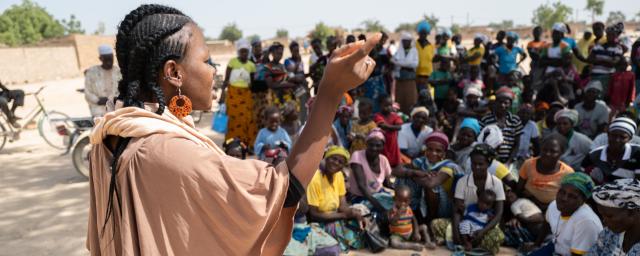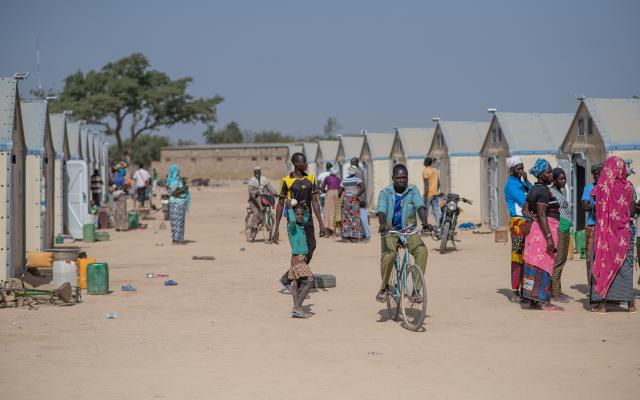
Huguette Yago is a water and sanitation engineer for AGED, an Oxfam partner. She carries out hygiene awareness sessions with internally displaced people, as well as managing groups of volunteers who maintain the latrines. In the context of the ongoing COVID-19 pandemic, she faces a challenge of titanic proportions: the lack of water.
Huguette Yago manages the supply of water and sanitation equipment, as well as organizing hygiene awareness sessions for 3,500 displaced people on the Pissila site in north-central Burkina Faso.
In the context of the ongoing COVID-19 pandemic, she faces a challenge of titanic proportions: the lack of water. “Without water, there is no hygiene,” she insists.
In the past year, armed groups have devastated villages in the north and east of the country, leaving more than 800,000 people displaced.
“Without water there is nothing you can do, and all the drilling attempts so far have come to nothing. There is no mystery: for there to be hygiene, there must be water.”
They have fled to urban centers or IDP sites where overcrowding and lack of access to water are huge problems for families and host communities.
The situation has become more desperate in light of the fact that Burkina Faso now has 261 confirmed cases of coronavirus and 14 deaths.
Advice that doesn’t translate into reality
Faced with this situation, staff of the Association for Environmental Management and Development (AGED), Oxfam's local partner in Burkina Faso, are doing everything to help displaced people and prevent the spread of the virus.
For Huguette, who oversees a team of six community workers responsible for raising awareness about hygiene measures, following the advice given by the WHO and the Ministry of Health – such as frequent hand washing with soap and water, wearing a mask and social distancing – are all very well in theory, but do not translate into reality for displaced people:

"They say they are aware of the disease but cannot comply with these measures because the little water they manage to get cannot be wasted washing their hands several times per day. In addition, the 400g soap they receive each month is not enough for the whole month. So how can they wash their hands regularly? "
As for social distancing, the situation is even more serious, since the shelters are supposed to receive a maximum of seven people, but the reality is quite different: "We are left with 15 to 20 people per shelter," says Huguette.
“Health is priceless”
Huguette has always wanted to work in the humanitarian sector and she tells us that she feels like she has found her calling. But the conditions are difficult, particularly with the arrival of this pandemic which has added to the already existing health crisis.
“We have to help and protect people, but we lack the resources to do so. There should be drilling for water near the sites, or an attempt to connect these sites to existing water systems, or at least water should be trucked in. All of this requires huge resources, but health is priceless.”

Despite their limited means, Huguette and her team do not give up and they organise themselves to meet the water, hygiene and sanitation needs of the displaced people.
“Everyone knows their job. We have three awareness sessions per week and the hygiene committee – made up of volunteers – takes over when we are not there. We explain to people that they can use ash to wash their hands when they don’t have enough soap.”

Oxfam and its partner AGED are providing humanitarian assistance to internally displaced people and host communities in the region by supplying clean water, sanitation and hygiene equipment. More than ever, we urgently need resources to provide 107 water points and hygiene measures for 287,000 people in Burkina Faso.
So far there are no recorded cases of coronavirus on the IDP sites where we operate, but with the growing influx of new arrivals, it is only a matter of time. For Huguette, it is essential to prevent the spread now, in particular by ensuring that site managers are well informed about the instructions given by the WHO so that they can in turn educate their peers.
“If the hygiene measures are applied, this will prevent the virus from spreading in these sites,” she said.
Photos: Sylvain Cherkaoui/Oxfam
Help Oxfam save lives in emergencies
When an emergency happens, Oxfam is ready to respond. We work with our partners on the ground to save lives and reduce future risks. With your support, we help make sure that people who have lost everything have access to immediate life-saving essentials.